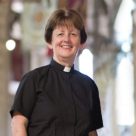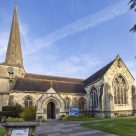Bishop Rachel has visited Israel and the Occupied Palestinian Territories (15-19 June 2024) to show solidarity with the Episcopal Diocese of Jerusalem and local Christians, and to listen and understand more about the conflict and its impact on the Diocese and local communities. The visit was organised by Canon Richard Sewell the Dean of St George’s College, Jerusalem.
Sunday, 16 June
Visit to St Andrew’s Church, Ramallah
At the invitation of Father Fadi, the parish priest at St Andrew’s in Ramallah, Bishop Rachel joined the local congregation in prayer and worship. The occasion was particularly memorable as Bishop Rachel was invited to hand out bibles to those that had recently graduated and to pass on a message of solidarity and support from the Diocese of Gloucester.
Following the service, Bishop Rachel met with 20 or so parishioners in the Church hall where she listened to moving testimonies of what it means to be a Palestinian Christian at this time and the daily reality of living under occupation and the shadow of war. The group consisted of young and old, men and women – all united by a common faith and a rootedness to the land that stretches back generations.
During the course of the conversations Bishop Rachel learnt of their sense of abandonment by the Church internationally, the devastating economic impact of the war on their livelihoods and their uncertainty of the future. She also head of courageous acts of non-violent resistance and of people not allowing this war or the ongoing occupation to consume them or to diminish their faith.
Meeting with Layan Nasir’s family
Following the Church service at St Andrew’s, Bishop Rachel travelled with Father Fadi the short distance to Berzeit where she met and had lunch with Lulu and Sami Nassir and their sons Basil and Kemal.
Over lunch, Lulu talked of the violent arrest of her 24 year old daughter, Layan, and her daughter’s subsequent administrative detention for 4 months at Damon prison in Israel.
Bishop Rachel heard how 15 armed soldiers entered the family home at 4 am in the morning, blindfolded and handcuffed Layan before leading her away. No charges have been brought against Layan and no family members have been allowed to visit her. In the month since she was arrested, her lawyer has only been allowed to visit her once. Father Fadi, her parish priest, has also been denied access to her.
Layan is meant to be released on 6 August but her parents and lawyer fear that her administrative detention will be renewed for a further 4 months with explanation.
The power to incarcerate people who have not been convicted or even charged with anything for lengthy periods of time, based on secret “evidence” that they cannot challenge, is an extreme power. It allows Israel to hold people without trial, without having committed an offense on the grounds that he or she plans to break the law in the future. As this measure is supposed to be preventive, it has no time limit.
Monday, 17 June
Home to about 7,000 Anglicans, worshipping in 28 congregations across five separate countries or territories: Jordan, Palestine, Lebanon, Syria and Israel, the Episcopal Diocese of Jerusalem is led by the Anglican Archbishop in Jerusalem, the Most Reverend Hosam E Naoum. The Diocese oversees more than thirty institutions including hospitals, schools, clinics and rehabilitation centres.
In a meeting with Archbishop Hosam, Bishop Rachel learned yet more of the work of the diocese and its churches as well as the challenges they currently face as worshipping communities and in their service to the people of the region, including at the Anglican Al Ahli Hospital in Gaza, the only functioning hospital in the north of Gaza.
Bishop Rachel also reflected with the Archbishop on the testimonies she had heard the previous day at St Andrew’s Ramallah and in her meeting with Layan Nasir’s parents.
 Meeting with Rabbi Michael Marmur (Rabbis for Human Rights)
Meeting with Rabbi Michael Marmur (Rabbis for Human Rights)
Bishop Rachel had a long discussion with Rabbi Michael Marmur, the Associate Professor of Jewish Theology at the Hebrew University College- Jewish Institute of Religion in Jerusalem.
Born and raised in England, Rabbi Michael moved to Israel in 1984. As a former chair of Rabbis for Human Rights, an organisation comprising rabbis and rabbinical students from diverse Jewish traditions that is driven by the profound Jewish values of justice, dignity and equality, Rabbi Michael has been involved for a long time in promoting and protecting human rights in Israel and the Occupied Palestinian territories.
In the meeting Rabbi Michael explained how although October 7th did not happen in a vacuum, the trauma created by the atrocities of that day was preventing people from imagining a more positive future. As a liberal progressive jew, he spoke of his fear that Israel’s trajectory over the last few years was making it increasingly difficult for Israel to be both Jewish and democratic.
Meeting with Hagop Djernazian (Save the Armenian Quarter)
Bishop Rachel met with Hagop Djernazian, a young Armenian Christian and head of the Armenian Scouts association, who has set up a local community action campaign to prevent a large part of the Armenian Quarter, called Cows Garden, being sold to an Australian Jewish developer.
The 98 year deal was originally signed by the Patriarch but the community are making a case that he did not have the authority to do so.
Speaking under the shadow of the cross that has been erected in Cows Garden, Bishop Rachel learnt how Hagop and his friends have helped galvanise the community to make a peaceful protest and bring a legal case both against the Patriarch and the developer. They are supported in their action by the wider Armenian diaspora and expert lawyers working pro bono. They keep a permanent tented presence in Cows Garden and have dealt with a number of violent intrusions.
The contestation of land in the Armenian Quarter is a micro example of how with global media and political attention focused on the war in Gaza, there has been a rise in land grabs and attacks by violent settlers across occupied Palestinians Territories and a spike in house demolitions in East Jerusalem. The future of the Christian presence in Jerusalem depends in part on how these micro events play out.
Meeting with Diane Corner, British Consul General
During her visit, Bishop Rachel had dinner with Diane Corner, British Consul General, to hear about the UK Government’s work in the region and the efforts to ensure that humanitarian aid is reaching those who need it in Gaza. Bishop Rachel also took the opportunity to raise the case of Layan Nasir who is being held in administrative detention.
Tuesday, 18 June
 Meeting with Bishop Munter Isaac
Meeting with Bishop Munter Isaac
In her visit to Bethlehem, Bishop Rachel met with Pastor Munther Isaac a Palestinian Christian pastor and theologian who pastors the Evangelical Lutheran Christmas Church in Bethlehem and the Lutheran Church in Beit Sahour. He is also the academic dean of Bethlehem Bible College, and is the director of the highly acclaimed and influential ‘Christ at the Checkpoint’ conferences. Munter came to wider attention with his nativity scene depicting the baby Jesus born under the rubble of Gaza wrapped in a Palestinian keffiyeh.
Pastor Munter spoke of his weariness of explaining the reality of the situation facing Palestinians to visiting Western delegations when the facts of occupation and the horrors of the war in Gaza have been well documented, but yet people remain silent on their return. Munter reasoned that this silence, and the empty calls for peace without a ceasefire or an end to occupied amounted to a form of complicity that required repentance.
He lamented that the silence of the Church in the West had compromised the credibility of the Christian message.
Meeting with the Holy Land Trust
Bishop Rachel spent a long but informative afternoon with the staff of the Holy Land Trust, a non-profit Palestinian organization that for over 20 years has been committed to fostering peace, justice and understanding in the Holy Land.
Over a meze lunch at their office in Bethlehem, Bishop Rachel learnt that the uniqueness of the Trust’s approach lies with the focus on personal transformation and addressing the spiritual trauma that prevents a just and lasting peace.
Bishop Rachel had the opportunity to see their work in action when she visited a Palestinian family in a village outside of Bethlehem whose home the Holy Land Trust had rebuilt following its demolition by Israeli authorities. Bishop Rachel learnt how this work is supported by Christian charities in the UK like the Amos Trust and how this is seen by the local community as an important act of international solidarity and witness.
Wednesday, 19 June
Meeting with Military Watch and visit to Ofer Military Court
Before travelling back to Tel Aviv and her onward fight home that afternoon, Bishop Rachel spent a full morning with Gerard Horton of Military Court Watch and visiting the Military Court at Ofer in the West Bank, which also serves as a detention centre and prison.
Bishop Rachel learned how children as young as 12 years can be arrested and prosecuted in military courts. Approximately 500 – 1000 are detained each year. 98% of the children live within close proximity of Israeli settlements and are convicted for crimes such as throwing rocks, often with little or no evidence. Prisons are currently over-crowded and conditions are very poor.
Established in 2013, Military Court Watch’s work is guided by the basic principle that children detained by the Israeli military authorities are entitled to all the rights and protections guaranteed under international law and that there is no legal justification for treating Palestinian and Israeli children differently under Israel’s military and civilian legal systems.
Military Court Watch advocates, and where appropriate, litigates, trying to ensure that all children who come in contact with the military legal system are treated with equality and in accordance with the law. Bishop Rachel was able to see this work in progress when she visited the Military Court at Ofer where she sat in on a number of cases.
Speaking to the families and the lawyers of those facing prosecution, Bishop Rachel was told how despite its outward appearance the military courts are not an impartial, neutral arbiter but rather serves as one of the central systems maintaining Israel’s control over the Palestinian people.





























